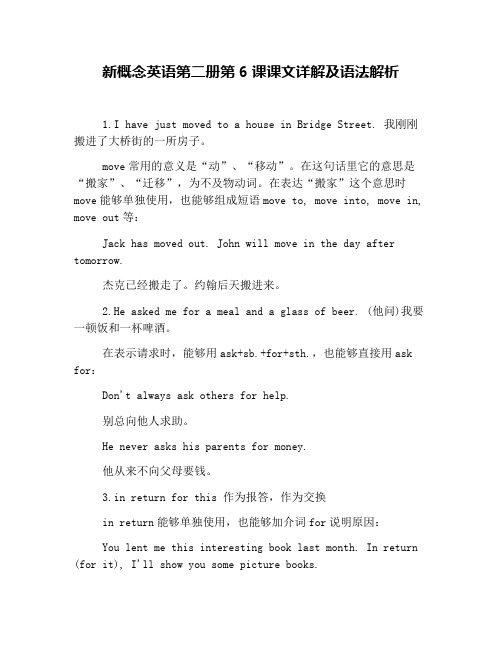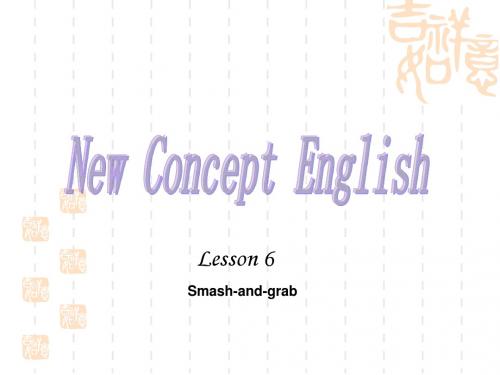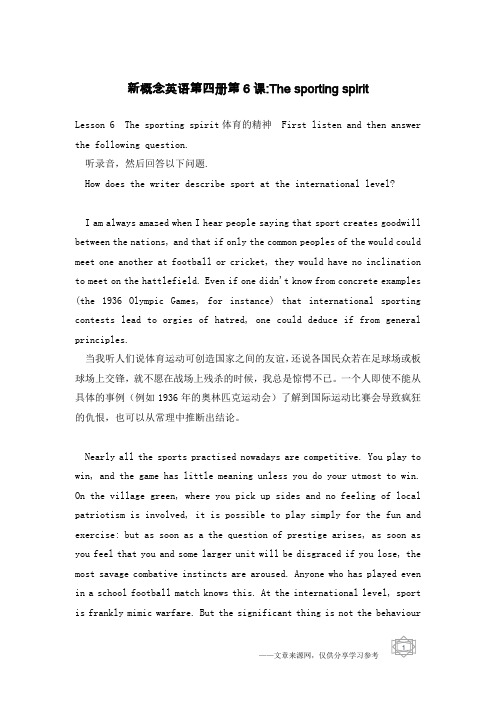新概念英语单词汉译英第6课
新概念英语第一册单词汉译英

第一课v.原谅pron.我(宾格)ad.是的v.是(第三人称单数) pron.这pron.你的,你们的n.(女用)手提包int原谅,再说一遍pron.它vt.感谢非常地第二课n.钢笔n.铅笔n.书n.手表n.上衣,外衣n.连衣裙n.裙子n.衬衣n.小汽车n.房子第三课n.伞int.请ad.这里pron.我的n.票n.号码num. 五a.对不起的n.先生n.衣帽存放处第四课n.一套衣服n.学校n.老师n.儿子n.女儿第五课先生a.好n.早晨小姐a.新的n.学生a.& n.法国人a.& n.德国人a.美好的v.遇见a.& n.日本人a.& n.韩国人a.& n.中国人ad.也第六课n.(产品的)牌号a.瑞典的a.英国的a.美国的a.意大利的n.沃尔沃n.标致n.梅赛德斯n.丰田n.大宇n.迷你n.福特n.菲亚特第七课pron.我v.(我)是v.be现在时复数n.名字a.& pron.什么n.国籍n.工作n.电脑键盘n.操作人员n.工程师第八课n.警察n.女警察出租汽车司机空中小姐n.邮递员n.护士n.机械师n.理发师n.家庭妇女n.送牛奶的人第九课int.喂(表示问候)int.喂,嗨ad.怎样ad.今天a.身体好a.美好的int.谢谢int.再见v.见第十课a.胖的n.女人a.瘦的a.高的a.矮的a.脏的a.干净的;v.清洗a.热的a.冷的a.老的a.年轻的a.忙的a.懒的第十一课pron.谁的a.蓝色的ad.大概a.白色的v.抓住第十二课n.父亲n.母亲n.女衬衫n.姐,妹n.领带;联系;vt.扎n.兄,弟pron. 他的pron.她的第十三课n.颜色a.绿色v.来ad.楼上a.时髦的,巧妙的n.帽子a.相同的a.可爱的,秀丽的第十四课n.箱子n.地毯n.狗第十五课n.海关n.官员n.女孩,姑娘a.& n.丹麦人n.朋友a.& n.挪威人n.护照a.棕色的n.旅游者第十六课a.& n.俄罗斯人a.& n.荷兰人pron.这些a.红色的a.灰色的a.黄色的a.黑色的a.橘黄色的;n.橙第十七课n.雇员a.勤奋的推销员n.男人n.办公室n.助手第十九课n.事情n.孩子们a.累,疲乏n.男孩a.渴n.妈妈坐下a.好,可以;n.右边冰淇淋第二十课a.大的a.小的a.开着的a.关着的a.轻的a.重的a.长的n.鞋子n.祖父,外祖父n.祖母,外祖母第二十一课v.给pron.一个pron.哪一个第二十二课a.空的;v.倒空,a.满的a.大的a.小的a.尖的,锋利的a.小的a.大的a.钝的n.盒子,箱子n.杯子n.茶杯n.瓶子n.罐头n.刀子n.叉子n.勺子第二十三课p rep.在…之上n.架子,搁板第二十四课n.课桌n.桌子n.盘子n.食橱n.香烟n.电视机n.地板梳妆台n.杂志n.床n.报纸n.立体声音响第二十五课n.夫人n.厨房n.电冰箱a.好,可以;n.右边a.带电的可通电的n.左边n.炉子,炊具n.中间prep.(属于)…的n.房间n.茶杯第二十六课ad.在哪里prep.在…里第二十七课客厅prep.靠近n.窗户n.手扶椅n.门n.图画n.墙第二十八课n.(复数)长裤第二十九课a.关着的n.卧室a.乱,不整齐aux.v.必须,应该a.开着的v.使…通风,换空气v.放置n.衣服n.大衣柜v.掸掉灰尘v.扫第三十课v.倒空,使…变空v.读v.削尖,使锋利穿上脱掉开(电灯)关(电灯)第三十一课n.花园prep.在…之下n.树v.爬,攀登pron.谁v.跑n.草,草地prep.在…之后prep.横过;穿过n.猫第三十二课v.打字n.信n.篮子v.吃n.骨头a.干净的;v.清洗n.牙齿v.做(饭菜)n.牛奶n.饭,一顿饭v.喝n.(水)龙头第三十三课n.日子n.云n.天空n.太阳v.照耀prep.和…在一起n.家庭(成员)v.走路,步行prep跨越在…之上n.桥n.船n.河n.轮船n.飞机v.飞第三十四课v.睡觉v.刮脸v.哭,喊v.洗v.等v.跳第三十五课n.照片n.村庄n.山谷prep.在…之间n.小山另一个n.妻子prep.沿着n.河岸n.水v.游泳n.大楼,建筑物n.公园prep.进入第三十六课prep.在…旁prep.离开第三十七课v.工作ad.努力地n(产品的)牌号v.做n.书橱,书架n.锤子v.上漆,涂n.& a.粉红色a.最喜欢的第三十八课n.作业v.听n.盘子,碟子第三十九课n.前面在…之前a.小心的,仔细的n.花瓶v.掉下n.花第四十课v.给…看v.送给v.带给第四十一课n.乳酪,干酪n.面包n.肥皂n.巧克力n.糖n.咖啡n.茶n.烟草,烟丝第四十二课n.鸟a.一些a.一些第四十三课当然n.水壶prep.在…后面n.茶壶ad.现在,此刻v.找到v.沸腾,开第四十五课aux.v.能够n.老板,上司n.分(钟)v.请求,要求n.书写a.糟糕的,可怕的第四十六课v.拿起,搬起,举起n.饼,蛋糕n.饼干第四十七课v.喜欢,想要v.想第四十八课a.新鲜的n.鸡蛋n.黄油a.纯净的n.蜂蜜a.成熟的n.香蕉n.果酱a.甜的a.橘黄色的;n.橙苏格兰威士忌a.上等的,精选的n.苹果n.酒,果酒n.啤酒n.黑板第四十九课n.卖肉的n.(食用)肉n.牛肉n.羔羊肉n.丈夫n.牛排n.肉馅,绞肉n.鸡v.告诉n.实情ad.也第五十课n.西红柿n.土豆n.卷心菜n.莴苣n.豌豆n.豆角n.梨n.葡萄n.桃第五十一课n.希腊n.气候n.国家; 乡村a.宜人的n.天气n.春季a.有风的a.温暖的v.下雨ad.有时n.夏天n.秋天n.冬天v.下雪n.一月n.二月n.三月n.四月n.五月n.六月n.七月n.八月n.九月n. 十月n.十一月n.十二月第五十二课美国n.巴西n.荷兰n.英国n.法国n.德国n.意大利n.挪威n.俄罗斯n.西班牙n.瑞典第五十三课a.温和的,温暖的ad.总是n.北方n.东方a.潮湿的n.西方n.南方n.季节a. 最好ad.最好地n.夜晚v.升起ad.早v.(太阳)落下去ad.晚,迟a.有趣的有意思的n.话题,主题n.谈话第五十四课n.澳大利亚n.澳大利亚人n.奥地利n.奥地利人n.加拿大n.加拿大人n.中国n.芬兰n.芬兰人n.印度n.印度人n.日本n.尼日利亚n.尼日利亚人n.土耳其n.土耳其人n.韩国n.波兰人n.波兰n.泰国人n.泰国第五十五课v.住,生活v.呆在,停留n.家;ad.在家,到家n.家务n.午饭n.下午ad.通常ad.一起n.晚上v.到达n.夜晚第五十七课ad.点钟n.商店n.片刻,瞬间第五十九课n.信封信纸售货员n.尺寸尺码,大小n.信笺簿n.胶水n.粉笔n.零钱找零;v.兑换第六十一课v.感觉v.看(起来)aux.v.必须,应该v.叫,请n.医生n.电话;v.打电话v.记得,记住n.嘴n.舌头a.坏的,严重的a.冷的n.消息第六十二课n.头痛n.阿斯匹林n.耳痛n.牙痛n.牙医胃痛n.药n.温度n.流行性感冒n.麻疹n.腮腺炎第六十三课a.较好的;ad.更好ad.当然起床ad.还,仍a.油腻的n.食物v.保持,继续第六十四课v.玩n.火柴v.谈话n.图书馆v.开车ad.如此地ad.快地身体探出v.打破n.喧闹声第六十五课n.爸(儿语)n.钥匙n.婴儿v.听见v.玩得快活,pron.你自己pron.我们自己n.妈妈第六十六课pron.我自己pron.他们自己pron.他自己pron.她自己第六十七课n.蔬菜水果零售商a.缺席的n.星期一n.星期二n.星期三星期四v.处于(状况)v.度过n.周末n.星期五n.星期六n.星期日n.国家; 乡村a.幸运的第六十八课n.教堂n.乳品店n.面包师傅n.食品杂货商第六十九课n.年n.比赛n.城镇n.人群v.站立a.使人激动的ad.正好,恰好n.结尾,结束n.获胜者prop.在…之后n.路途第七十课n.文具商n.丹麦第七十一课ad让人讨厌的坏的n.电话;v.打电话n.次(数)v.接(电话)a.最后的,前一次的n.电话ad.又一次地v.说第七十三课n.周n.伦敦ad.突然地公共汽车车站v.微笑ad.愉快地v.懂,明白v.讲,说n.手n.衣袋n.短语手册n.短语ad.缓慢地第七十四课ad.匆忙地v.割,切ad.口渴地v.走v.问候,打招呼第七十五课ad.以前v.买n.双,对n(服装的)流行式样a.不舒服的v.穿着第七十七课n.约会,预约a.紧急的,急迫的prep.直到…为止第七十九课n.购物n.单子n.蔬菜v.需要v.希望n.事情n.钱第八十课n.食品杂货n.水果n.文具n.报刊零售人n.药剂师,化学家第八十一课n.洗澡ad.几乎,将近a.准备好的完好的n.正餐,晚餐n.饭馆,餐馆a.烤的第八十二课n.早饭n.理发n.聚会n.假日第八十三课n.杂乱,凌乱v.包装,打包,装箱n.手提箱v.离开ad.已经第八十五课n.巴黎n.电影院n.电影a.漂亮的n.城市ad.从来没有ad.在任何时候第八十七课n.接待员v.带来,送来n.车库,汽车修理厂n.碰撞灯杆v.修理v.努力,设法第八十九课v.相信,认为(请求许可)可以多长prep.自从ad.为什么v.卖,出售conj.因为v.退休v.花费n.英镑(£)prep.值…钱n.便士第九十一课ad.还,仍旧v.搬家v.想念,思念n.邻居n.人n.人们a.可怜的; 贫穷的第九十三课n.飞行员v.返回;n.往返n.纽约n.东京n.马德里v.飞第九十四课n.雅典n.柏林n.孟买n.日内瓦n.莫斯科n.罗马n.汉城n.斯德哥尔摩n.悉尼第九十五课v.返回;n.往返n.火车n.站台n.大量n.酒吧n.车站,火车站n.收票员v.抓住;赶上v.想念;思念;错过第九十七课v.离开;v.遗留;v.描述n.拉链n.标签n.提手,把手n.地址n.便士penny复数v.属于第九十九课int.哎哟v.滑倒,滑了一脚v.落下,跌倒ad.下楼v.伤,伤害,疼痛n.背起立,站起来v.帮助立即a.一定的,确信的n.X光透视第一百课n.执照第一百零一课n.苏格兰n.明信片n.青年n.招待所,旅馆n.协会ad.不久v.写第一百零三课n.考试v.及格,通过n.数学n.问题a.容易的a足够的ad.足够地n.考卷v.未及格,失败v.接(电话)n.分数n.其他的东西a.困难的v.讨厌a.低的,矮的v.振作,振奋n.家伙,人n.上方,顶部第一百零四课a.聪明的a.笨的a.便宜的a.贵的a.新鲜的a.变馊的a.低的,矮的a.大声的a.高的ad.努力地;硬的a.甜的a.软的a.酸的第一百零五课v.拼写a.聪明的有智慧的n.错误n.礼物n.词典第一百零六课v.携带v.改正,纠正v.保存;保留第一百零七课n.夫人,女士a.漂亮的同样v.适于a.漂亮的第一百零九课n.主意少许n.一满茶匙a.较少的,更小的几个n.遗憾ad.代替n.建议,忠告第一百一十课最多的最小的,最少的a. 最好ad.最好地更坏的a.最坏的第一百一十一课n.型号,式样v.付得起(钱)n.预付定金n.分期付款n.价格n.百万富翁第一百一十三课n.售票员n.车费,车票n.零钱,找零;v.兑换n.纸币n.乘客pron没有任何东西ad.也不下车n.流浪汉prep.除…外第一百一十五课pron.任何人v.敲,打pron.一切事物a.宁静的,安静的a.不可能的v.邀请pron.任何东西pron.什么也没有n.柠檬水v.开玩笑第一百一十六课a.睡觉,睡着n.眼镜第一百一十七课饭厅n.硬币n.嘴v.吞下ad.后来n.厕所,盥洗室第一百一十九课v.响n.故事v.发生n.贼v.进入a.黑暗的n.手电筒n.(说话的)声音n.鹦鹉第一百二十一课练习本n.顾客v.忘记n.经理v.照应,服务,接待n.柜台v.认识;认出第一百二十二课n.路第一百二十三课prep.在…期间n.旅行v.旅行v.提供n.工作v.猜v.长,让…生长n.胡子,络腮胡子第一百二十四课n.小猫第一百二十五课n.水;v.浇水ad.非常a.干燥的,干的n.讨厌的东西或人v.意味着,意思是n.惊奇,意外的事第一百二十六课ad.立即地第一百二十七课a.著名的n.女演员至少n.男演员v.读第一百二十九课v.招手n.跑道n.英里v.从后面超越,超车限速v.做梦,思想不集中n.标记,牌子驾驶执照v.罚款n.亲爱的(表示称呼)第一百三十一课n.埃及ad.国外v.担忧第一百三十三课n.记者a.爆炸性的貂皮大衣第一百三十五课a.未来的结婚n.饭店a.最新的v.介绍第一百三十七课n.足球n.赌注v.赢n.世界a.可怜的; 贫穷的v.依靠第一百三十九课a.额外的n.工程师a.海外的,国外的n.工程n.公司n.线路第一百四十一课a.兴奋的登上a.中年的prep.在…对面ad.好奇地a.可笑的,滑稽的n.香粉n.带镜的化妆盒ad.和蔼地a.丑陋的a.有趣的v.微笑a.尴尬的,窘迫的第一百四十二课a.担心,担忧ad.经常地,定期地第一百四十三课v.包围n.树林风景点n.百n.城市prep.穿过n参观者,来访者a.整齐的n.杂乱的东西废物筐v.放v.扔,抛n.垃圾v.数,点v.覆盖n.碎片n.轮胎a.生锈的prep.在…之间v.依法处置。
新概念英语第四册第6课-The sporting spirit

新概念英语第四册第6课:The sporting spirit Lesson 6 The sporting spirit体育的精神First listen and then answer the following question.听录音,然后答复以下问题.How does the writer describe sport at the international levelI am always amazed when I hear people saying that sport creates goodwill between the nations, and that if only the common peoples of the would could meet one another at football or cricket, they would have no inclination to meet on the hattlefield. Even if one didn t know from concrete examples (the 1936 Olympic Games, for instance) that international sporting contests lead to orgies of hatred, one could deduce if from general principles.当我听人们说体育运动可创造国家之间的友谊,还说各国民众假设在足球场或板球场上交锋,就不愿在战场上残杀的时候,我总是惊愕不已。
一个人即使不能从具体的事例〔例如1936年的奥林匹克运动会〕了解到国际运动比赛会导致疯狂的仇恨,也可以从常理中推断出结论。
Nearly all the sports practised nowadays are competitive. You play to win, and the game has little meaning unless you do your utmost to win. On the village green, where you pick up sides and no feeling of local patriotism is involved, it is possible to play simply for the fun and exercise: but as soon as a the question of prestige arises, as soon as you feel that you and some larger unit will be disgraced if you lose, the most savage combative instincts are aroused. Anyonewho has played even in a school football match knows this. At the international level, sport is frankly mimic warfare. But the significant thing is not the behaviour of the players but the attitude of the spectators: and, behind the spectators, of the nations who work themselves into furies over these absurd contests, and seriously believe -- at any rate for short periods -- that running, jumping and kicking a ball are tests of national virtue.现在开展的体育运动几乎都是竞争性的。
新概念英语第二册第6课课文详解及语法解析

新概念英语第二册第6课课文详解及语法解析1.I have just moved to a house in Bridge Street. 我刚刚搬进了大桥街的一所房子。
move常用的意义是“动”、“移动”。
在这句话里它的意思是“搬家”、“迁移”,为不及物动词。
在表达“搬家”这个意思时move能够单独使用,也能够组成短语move to, move into, move in, move out等:Jack has moved out. John will move in the day after tomorrow.杰克已经搬走了。
约翰后天搬进来。
2.He asked me for a meal and a glass of beer. (他问)我要一顿饭和一杯啤酒。
在表示请求时,能够用ask+sb.+for+sth.,也能够直接用ask for:Don't always ask others for help.别总向他人求助。
He never asks his parents for money.他从来不向父母要钱。
3.in return for this 作为报答,作为交换in return能够单独使用,也能够加介词for说明原因:You lent me this interesting book last month. In return (for it), I'll show you some picture books.你上个月把这本有趣的书借给了我。
作为报答,我将给你看一些画册。
In return for your help, I invite you to spend the weekend with my family.你帮了我的忙。
作为回报,我邀请你与我的家人一起过这个周末。
ter a neighbour told me about him. 后来,一位邻居告诉了我他的情况。
新概念第六课

One of the thieves was struck by a heavy statue, but he was too busy helping himself to diamonds to notice any pain. help oneself to sth.自便 -- My roommate helped herself to my clothes without asking me.
grab v.抢夺, 掠夺, 夺取(= seize suddenly) -- He grabbed me by the arm. -- He grabbed the coin and ran off. 他抓起硬币就跑了。 snatch vt.抢, 夺取 (= catch sth. /sb suddenly and violently) -- The big bird snatches the hen from the ground. Seize v.抓住, 逮住, 夺取(强调抓住、抓到的结果) -- Fear seized her. 她突然感觉很恐惧。 catch vt.捕获, 赶上(车船等) (= get hold of sth/sb moving) -- catch mouse / catch bus / catch a thief grasp 强调“掌握” get the hang of -- We have already grasped six thousand words. Hold 强调抓牢、抓紧(catch hold of 抓住) -- He is holding an umbrella.
4>ir -- 加在以r开头的形容词之前 -- regular(adj.规则的) àirregular(adj.不规则的) -- rational(adj.理性的) àirrational(adj.无理性的) -- resistible(adj.可抵抗的) àirresistible(adj.不可抵抗的) 5>in --主要用于其它字母开头的词之前 -- human(adj.人性的) àinhuman(adj.野蛮的) -- correct(adj.正确的) àincorrect(adj.不正确的) -- justice(n.正义, 公平) àinjustice(n.不正义, 不公平) -- sincere(adj.真诚的) àinsincere(adj.虚假的, 不真诚的)
新概念英语第四册第6课-The sporting spirit

新概念英语第四册第6课:The sporting spiritLesson 6 The sporting spirit体育的精神 First listen and then answer the following question.听录音,然后回答以下问题.How does the writer describe sport at the international level?I am always amazed when I hear people saying that sport creates goodwill between the nations, and that if only the common peoples of the would could meet one another at football or cricket, they would have no inclination to meet on the hattlefield. Even if one didn't know from concrete examples (the 1936 Olympic Games, for instance) that international sporting contests lead to orgies of hatred, one could deduce if from general principles.当我听人们说体育运动可创造国家之间的友谊,还说各国民众若在足球场或板球场上交锋,就不愿在战场上残杀的时候,我总是惊愕不已。
一个人即使不能从具体的事例(例如1936年的奥林匹克运动会)了解到国际运动比赛会导致疯狂的仇恨,也可以从常理中推断出结论。
Nearly all the sports practised nowadays are competitive. You play to win, and the game has little meaning unless you do your utmost to win. On the village green, where you pick up sides and no feeling of local patriotism is involved, it is possible to play simply for the fun and exercise: but as soon as a the question of prestige arises, as soon as you feel that you and some larger unit will be disgraced if you lose, the most savage combative instincts are aroused. Anyone who has played even in a school football match knows this. At the international level, sport is frankly mimic warfare. But the significant thing is not the behaviourof the players but the attitude of the spectators: and, behind the spectators, of the nations who work themselves into furies over these absurd contests, and seriously believe -- at any rate for short periods -- that running, jumping and kicking a ball are tests of national virtue. 现在开展的体育运动几乎都是竞争性的。
新概念英语第二册第6课

课文讲解
6.He called at every house in the street once a month and always asks for a meal and a glass of beer.他每月对这条街上的住户光顾一次,总是请求给他 一顿饭和一杯啤酒。 call表示光顾,拜访,叫唤,打电话等意思 1) call at somewhere:光顾某地 e. g. The train calls at the large stations only. He called at the post office on the way home. 2) call on sb.:拜访某人 e. g. Mary calls on her grandmother every Sunday. 3) call sb./sth.upa打电话给某人;唤起记忆,使回忆起 e. g. The trip to the village called up scenes of my childhood. I will call you up this evening. 4) call for sth. :需要,要求 e.g. The occasion calls for prompt action. The task called for great care and patience.
stand on one' s head倒立, 类似的词组有 stand on one‘s hands:用手着地(hand单数就是一只手, 复数就是双手) stand on one’ s knees(膝盖) 跪下 lie in bed 躺床上 lie on one' s back 仰卧 lie on one' s side 侧卧 lie on one’ s stomach(胃部) 趴下
新概念英语第三册课文及详解第6课
Smash-and-grab 砸橱窗抢劫The expensive shops in a famous arcade near Piccadilly were just opening. At this time of the morning, the arcade was almost empty。
Mr Taylor, the owner of a jewellery shop was admiring a new window display。
Two of his assistants had been working busily since 8 o'clock and had only just finished. Diamond necklaces and rings had been beautifully arranged on a background of black velvet。
After gazing at the display for several minutes, Mr Taylor went back into his shop。
The silence was suddenly broken when a large car,with its headlights on and its horn blaring, roared down the arcade。
It came to a stop outside the jeweler’s. One man stayed at the wheel while two others with black stockings over their faces jumped out and smashed the window of the shop with iron bars. While this was going on, Mr Taylor was upstairs。
《新概念英语》第二册第6课
Lesson 61:I have just moved to a house in Bridge Street. Yesterday a beggar knocked at my door.1) :move:1>. move 搬,移动A: We need more space for the fridge. 我们需要更多的空间来放冰箱.B: Right. Let's move this chair to the living room. 没错,那我们把这张椅子搬到客厅吧.2>. move 搬迁英to (cause to) change the place where one lives or does businessA: I'm moving to Taichung because teahouses are more popular there.我要搬到台中去,因为红茶店在那里比较受欢迎.B: Good luck then. I hope you make a fortune.那麼祝你好运罗,我希望你能赚大钱.3>. move 感动英to affect with tender emotion or feeling A: Did he send you any flowers or chocolates?他有送你花或是巧克力吗?B: No. But he wrote a lot of moving letters.没有,不过他写了很多动人的情书2) :beg1>. 口语中说的I beg your pardon可以有多种用法:(1) 用于道歉,比用I’m sorry更正式。
如:I beg your pardon. I suppose I should have knocked. 对不起,我想我本来应该敲门的。
(2) 用于没听清或没听懂对方的话,请对方再说一遍(可只说Pardon,说时用升调)。
新概念英语第二册 lesson 6
③ vt. 把(某人)打成……状态 He knocked Tom out yesterday. 他昨天把汤姆打 昏过去了。 ④ 与off连用时有一些特殊含义,一般用于口语 vt. (价格上)减去,除去,打折扣 They knocked five dollars off the price of the coat. The shop assistant knocked 10% off the bill.(He reduced the price by 10%.) vi. 下班,停止,中断(工作等) When do you usually knock off? 你一般什么时候 下班? He knocked off for lunch at half past eleven. 他 十一点半休息吃中午饭。
stood on his head 倒立 stand on one‘s hands 用手着地(hand单数就是一只手, 双手复数) stand on one's knees 跪着, 膝盖 lie on one's back 仰面躺着 lie on one's side 侧躺 lie on one's stomach 趴着
★knock
① vi. 敲门 I knocked, but no one answered. knock at 敲(门、窗等) knock at the door;knock at the window ② vt.&vi. 碰撞 You always knock things off the table. 你总是碰掉 桌上的东西。 Jim was knocked over by a bus this morning. 今天 上午吉姆被一辆公共汽车撞倒了。 She has knocked a cup over again. 她又碰倒了一个 杯子。
新概念英语第三册课文翻译及学习笔记:Lesson6
新概念英语第三册课文翻译及学习笔记:Lesson6【课文】The expensive shops in a famous near Piccadilly werejust opening. At this time of the morning, the arcade was almost empty. Mr. Taylor, the owner of a jewellery shop was admiring a new display. Two of his assistants had beenworking busily since eight o'clock and had only just finished. Diamond necklaces and rings had been beautifully arranged ona background of black velvet. After gazing at the display for several minutes, Mr. Taylor went back into his shop.The silence was suddenly broken when a large car, withits headlights on and its home blaring, roared down the arcade. It came to a stop outside the jeweller's. One man stayed at the wheel while two others with black stocking over their faces jumped out and smashed the window of the shopwith iron bars. While this was going on, Mr. Taylor was upstairs. He and his staff began throwing furniture out ofthe window. Chairs and tables went flying into the arcade.One of the thieves was struck by a heavy statue, but he wastoo busy helping himself to diamonds to notice any pain. The raid was all over in three minutes, for the men scrambledback into the car and it moved off at a fantastic speed. Just as it was leaving, Mr. Taylor rushed out and ran after it throwing ashtrays and vases, but it was impossible to stopthe thieves. They had got away with thousands of pounds worth of diamonds.【课文翻译】皮卡迪利大街附近的一条拱廊街道上,几家高档商店刚刚开始营业。
